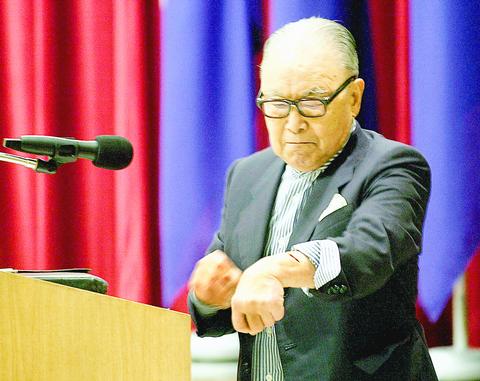A KMT elder and former diplomat cut his wrist during a meeting yesterday to protest the party's failure to expel former party chairman Lee Teng-hui (
The drastic move by Konsin Shah (夏功權), a former representative to the US between 1979 and 1981, took place during a meeting of the KMT Central Advisory Council.
"Many members have said they would kill themselves if the opposition camp fails to retake the presidency in two and a half years," Shah, 81, told the council, composed mainly of members who fled China after the civil war. "I may not be alive by then, so I would like to set an example today."

PHOTO: FANG PIN-CHAO, TAIPEI TIMESN
The octogenarian then slipped a blade out of his briefcase and slit his left wrist at the podium, saying, "Chairman Lien Chan (連戰) must unite the party and handle the proposal to expel Lee for the sake of justice."
The suicide attempt threw the assembly into disarray.
Chang Che-chen (
Shah was rushed to the nearby National Taiwan University Hospital and was in stable condition.
As before, the KMT chair declined to address the Lee issue to avoid alienating Lee supporters.
It is generally believed the DPP would not have won the presidency last year if two splinter groups, the People First Party and the New Party, had not broken away from the KMT.
In addition, some KMT mem-bers such as Shah attributed the DPP victory in part to Lee's secret backing. The alleged collusion led hundreds of grassroots members to besiege the KMT headquarters for days after the election debacle, pressing for Lee's downfall.
Shah, who received his law degree from Washington DC's Georgetown University, held several diplomatic posts, including ambassador to Uruguay and New Zealand.
Earlier, Shah and fellow member Liang Su-yung (梁肅戎) filed a joint complaint with the KMT disciplinary department, accusing Lee of betraying the party.
They cited as evidence Lee's public statements that he would stump for legislative candidates from the Taiwan Solidarity Union, formed primarily by former ranking KMT members sympathetic to the former president. Shah maintained that if Lee wasn't expelled, the KMT would collapse within two years.
Echoing Shah's apprehension, Wang Tso-yung (
Wang, who advised Lee to join the KMT, said he regrets the move as the biggest mistake he ever made in his life.
Ironically, the Central Advisory Council, created by Lee to appease the KMT old guard, has been the main venue for Lee-bashing.

MAKING WAVES: China’s maritime militia could become a nontraditional threat in war, clogging up shipping lanes to prevent US or Japanese intervention, a report said About 1,900 Chinese ships flying flags of convenience and fishing vessels that participated in China’s military exercises around Taiwan last month and in January last year have been listed for monitoring, Coast Guard Administration (CGA) Deputy Director-General Hsieh Ching-chin (謝慶欽) said yesterday. Following amendments to the Commercial Port Act (商港法) and the Law of Ships (船舶法) last month, the CGA can designate possible berthing areas or deny ports of call for vessels suspected of loitering around areas where undersea cables can be accessed, Oceans Affairs Council Minister Kuan Bi-ling (管碧玲) said. The list of suspected ships, originally 300, had risen to about

DAREDEVIL: Honnold said it had always been a dream of his to climb Taipei 101, while a Netflix producer said the skyscraper was ‘a real icon of this country’ US climber Alex Honnold yesterday took on Taiwan’s tallest building, becoming the first person to scale Taipei 101 without a rope, harness or safety net. Hundreds of spectators gathered at the base of the 101-story skyscraper to watch Honnold, 40, embark on his daredevil feat, which was also broadcast live on Netflix. Dressed in a red T-shirt and yellow custom-made climbing shoes, Honnold swiftly moved up the southeast face of the glass and steel building. At one point, he stepped onto a platform midway up to wave down at fans and onlookers who were taking photos. People watching from inside

Japan’s strategic alliance with the US would collapse if Tokyo were to turn away from a conflict in Taiwan, Japanese Prime Minister Sanae Takaichi said yesterday, but distanced herself from previous comments that suggested a possible military response in such an event. Takaichi expressed her latest views on a nationally broadcast TV program late on Monday, where an opposition party leader criticized her for igniting tensions with China with the earlier remarks. Ties between Japan and China have sunk to the worst level in years after Takaichi said in November that a hypothetical Chinese attack on Taiwan could bring about a Japanese

The WHO ignored early COVID-19 warnings from Taiwan, US Deputy Secretary of Health and Human Services Jim O’Neill said on Friday, as part of justification for Washington withdrawing from the global health body. US Secretary of State Marco Rubio on Thursday said that the US was pulling out of the UN agency, as it failed to fulfill its responsibilities during the COVID-19 pandemic. The WHO “ignored early COVID warnings from Taiwan in 2019 by pretending Taiwan did not exist, O’Neill wrote on X on Friday, Taiwan time. “It ignored rigorous science and promoted lockdowns.” The US will “continue international coordination on infectious